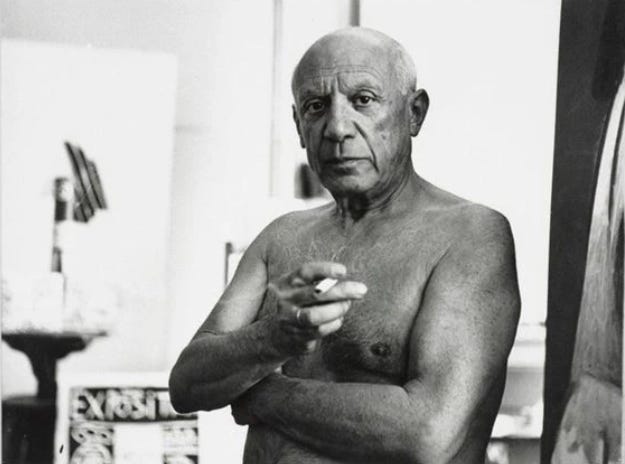Welcome to Fed—I’m thrilled you’re here! This is your go-to resource for nutrition questions and controversies. Think of me as your tutor—here to break down the noise, offer context, and help make sense of it all.
Pablo Picasso lived to 91 years old, despite being a heavy smoker, drinking wine regularly, and indulging in cheese, bread, and pastries. So why did he live so long while others with similar habits develop chronic illnesses earlier in life? The answer may lie in epigenetics—the study of how our behaviors and environment influence the way our genes are expressed.
Epigenetics 101: Turning Genes "On" and "Off"
Think of your DNA as a cookbook you inherit from your parents. Just like a locked PDF where the text can’t be changed, the recipes (your genes) in the book stay the same. But here’s where epigenetic markers come in—they act like a red pen, underlining some ingredients, crossing out others, and even scribbling notes in the margins. These edits help determine which recipes get made and how much of each ingredient is used—in other words, which genes are turned on, off, or dialed up or down.
Take height, for example. Your DNA might include the recipe for tall stature, but whether you reach that potential depends on what’s available in your diet—specifically, how much protein you consumed as a child. If you had plenty, your body could follow the recipe as written, activating growth genes and building strong bones and muscles. But if protein was limited, epigenetic markers might step in, crossing out key instructions and slowing down growth. The result? You may end up shorter than your genetic blueprint intended, not because the recipe changed, but because the ingredients weren’t there to bring it to life.
How Picasso’s Lifestyle May Have Influenced His Epigenetics
Mediterranean Diet and Longevity
Picasso’s diet was said to be rich in olive oil, fish, fresh vegetables, and fruits, all of which contain antioxidants and anti-inflammatory compounds.
Research suggests that diets high in these nutrients can influence epigenetic mechanisms, potentially reducing the risk of heart disease and cancer by silencing harmful genes and activating protective ones.
Smoking and Epigenetic Damage
Picasso was a heavy smoker, which is known to cause negative epigenetic changes that increase the risk of lung disease and cancer.
However, not everyone who smokes develops disease, and epigenetic modifications may play a role. It’s possible that his diet and lifestyle helped counteract some of the damage caused by smoking.
Active Brain and Creativity
Picasso worked prolifically into old age, constantly creating and innovating.
Studies show that lifelong learning and mental stimulation can influence epigenetic markers related to brain plasticity, potentially lowering the risk of neurodegenerative diseases like Alzheimer’s.
Wine, but in Balance
While excessive alcohol is harmful, moderate intake may have played a protective role in Picasso’s health.
A healthy dietary pattern, including the "Mediterranean way of drinking"—regular, moderate wine consumption, primarily with meals (up to two glasses per day for men and one for women)—has been linked to increased longevity. It is important to note that the Mediterranean way of drinking is often in communion with others, which has also been linked to longevity.
Why This Matters
Picasso’s genetics may have played a role in his longevity, but his lifestyle choices likely influenced how those genes were expressed. The balance between good habits (diet, creativity, moderate eating) and risky ones (smoking, wine, pastries) may have shaped his health outcomes in a unique way.
This is the essence of epigenetics: while we can’t change the DNA we inherit, we do have control over how it’s expressed. We may not be able to manipulate a canvas like Picasso, but we can shape our health through the choices we make every day.
Putting this into practice
There’s no shortage of nutrition advice out there—cut back on saturated fat to protect your heart, limit processed foods to avoid excess sodium and calories, eat more omega-3s for brain health, drink less alcohol for… well, everything. The list goes on. But these recommendations often come at us in bits and pieces, usually focusing on single nutrients (like magnesium) or single ingredients (like butter), making it tough to figure out what it actually means for your day-to-day eating.
Picasso’s story reminds us of something important: you don’t have to live a perfectly “healthy” life to live a long one. Plenty of people chase perfection and still end up with chronic diseases. Why? Because our genes play a big role. They’re not our destiny, but they do give us clues about what to pay attention to when sifting through all the nutrition advice out there.
Take me, for example. I’ve got pretty good genes. I met all four of my grandparents, and all but one lived well past 80. We don’t have a family history of cardio-metabolic diseases (heart disease, diabetes, kidney disease), but I do pay attention to skin cancer and brain health—things that show up in my genetic “cookbook.”
For the most part, I eat a balanced, healthy diet, never smoked, have access to good healthcare, stay active, sleep like a champ, and keep my stress levels in check. But one small tweak I’ve recently made? Prioritizing omega-3s. Now, I try to eat walnuts daily (I love them so it’s not a dread) and raw salmon at least once a week (cooked salmon is a no-go for me—it’s way too fishy, but raw? I love it!).
At the end of the day, it’s about understanding your genetic blueprint and making choices that work for your health—not chasing some one-size-fits-all idea of perfection.












